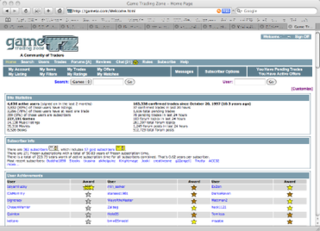Social software, also known as social apps or social platform includes communications and interactive tools that are often based on the Internet. Communication tools typically handle capturing, storing and presenting communication, usually written but increasingly including audio and video as well. Interactive tools handle mediated interactions between a pair or group of users. They focus on establishing and maintaining a connection among users, facilitating the mechanics of conversation and talk. Social software generally refers to software that makes collaborative behaviour, the organisation and moulding of communities, self-expression, social interaction and feedback possible for individuals. Another element of the existing definition of social software is that it allows for the structured mediation of opinion between people, in a centralized or self-regulating manner. The most improved area for social software is that Web 2.0 applications can all promote co-operation between people and the creation of online communities more than ever before. The opportunities offered by social software are instant connections and opportunities to learn. An additional defining feature of social software is that apart from interaction and collaboration, it aggregates the collective behaviour of its users, allowing not only crowds to learn from an individual but individuals to learn from the crowds as well. Hence, the interactions enabled by social software can be one-to-one, one-to-many, or many-to-many.

An Internet forum, or message board, is an online discussion site where people can hold conversations in the form of posted messages. They differ from chat rooms in that messages are often longer than one line of text, and are at least temporarily archived. Also, depending on the access level of a user or the forum set-up, a posted message might need to be approved by a moderator before it becomes publicly visible.
In cryptography, a certificate authority or certification authority (CA) is an entity that stores, signs, and issues digital certificates. A digital certificate certifies the ownership of a public key by the named subject of the certificate. This allows others to rely upon signatures or on assertions made about the private key that corresponds to the certified public key. A CA acts as a trusted third party—trusted both by the subject (owner) of the certificate and by the party relying upon the certificate. The format of these certificates is specified by the X.509 or EMV standard.
Magnatune is an American independent record label based in Berkeley, California, founded in spring 2003. It only sold music for download through its website but added a print-CD-on-demand service in late 2004 and in October 2007 began selling complete albums and individual tracks through Amazon.com. In May 2008, Magnatune launched all-you-can-eat membership plans. From March 2010 Magnatune dropped the CD printing service and moved exclusively to all-you-can-eat membership plans. Magnatune was the first record label to license music online and as of May 2015 had sold over 7,000 licenses in its twelve years of existence.

Xanga was a website that hosted weblogs, photoblogs, and social networking profiles. It was operated by Xanga.com, Inc. and based in New York City.
The social web is a set of social relations that link people through the World Wide Web. The social web encompasses how websites and software are designed and developed in order to support and foster social interaction. These online social interactions form the basis of much online activity including online shopping, education, gaming and social networking services. The social aspect of Web 2.0 communication has been to facilitate interaction between people with similar tastes. These tastes vary depending on who the target audience is, and what they are looking for. For individuals working in the public relation department, the job is consistently changing and the impact is coming from the social web. The influence held by the social network is large and ever changing.

Web 2.0 refers to websites that emphasize user-generated content, ease of use, participatory culture, and interoperability for end users.
An online trading community provides participants with a structured method for trading, bartering, or selling goods and services. These communities often have forums and chatrooms designed to facilitate communication between the members. An online trading community can be likened electronic equivalent of a bazaar, flea market, or garage sale.
My Opera was the virtual community for Opera web browser users. It belonged to Opera Software ASA. In addition to being a support site for the Opera browser, My Opera worked like a social networking site. It offered services such as blogs, photo albums, the free email service My Opera Mail and more. My Opera was closed down on March 3, 2014.

GameTZ.com is an online trading community established in late 1996 which allows people to trade video games, books, music, movies, and other items through negotiating with other traders from countries worldwide. Once a trade is completed, a record is created on the site for future reference.
Askville was a user-driven research site founded by Amazon.com. It was opened to the public on December 8, 2006, and shut down on October 25, 2013.

Shelfari was a social cataloging website. Shelfari users built virtual bookshelves of the titles they owned or had read, and could rate, review, tag, and discuss their books. Users could also create groups that other members could join, create discussions, and talk about books, or other topics. Recommendations could be sent to friends on the site for what books to read.
Quechup (kway-chup) was a social networking website that came to prominence in 2007 when it used automatic email invitations for viral marketing to all the e-mail addresses in its members' address books. This was described as a "spam campaign" and raised a great deal of criticism.
Goodreads is an American social cataloging website and a subsidiary of Amazon that allows individuals to search its database of books, annotations, quotes, and reviews. Users can sign up and register books to generate library catalogs and reading lists. They can also create their own groups of book suggestions, surveys, polls, blogs, and discussions. The website's offices are located in San Francisco.
Fotki is a digital photo sharing, video sharing and media social network website and web service suite; it is one of the world's largest social networking sites. As an image hosting service, Fotki licenses photo-sharing software for global companies such as Telecom Italia, Alice.it, Sears, Mark Travel, Vegas.com, and Funjet.com, among others.
Redmine is a free and open source, web-based project management and issue tracking tool. It allows users to manage multiple projects and associated subprojects. It features per project wikis and forums, time tracking, and flexible, role-based access control. It includes a calendar and Gantt charts to aid visual representation of projects and their deadlines. Redmine integrates with various version control systems and includes a repository browser and diff viewer.

Ubuntu One is an OpenID-based single sign-on service operated by Canonical Ltd. to allow users to log onto many Canonical-owned Web sites. Until April 2014, Ubuntu One was also a file hosting service and music store that allowed users to store data "in the cloud".

Whiskey Media was an American online media company founded independently by CNET co-founder Shelby Bonnie in 2008. It was the parent company of Tested, Screened, and Anime Vice, and the former parent company of Giant Bomb and Comic Vine. Whiskey Media websites were wiki community based, while maintaining an editorial staff. The company's target demographic was focused primarily on males between 10 and 30. The name "Whiskey Media" is a reference to a Kentucky distillery that was owned by the family of Shelby Bonnie before prohibition. Whiskey Media operated in San Francisco, California, after previously being located in Sausalito. On March 15, 2012, Whiskey Media was acquired by Lloyd Braun and Gail Berman's BermanBraun along with Tested, Screened, and Anime Vice while Giant Bomb and Comic Vine were bought separately by CBS Interactive.

Book swapping or book exchange is the practice of a swap of books between one person and another. Practiced among book groups, friends and colleagues at work, it provides an inexpensive way for people to exchange books, find out about new books and obtain a new book to read without having to pay. Because swaps occur between individuals, without central distribution or warehousing, and without the copyright owner making a profit, the practice has been compared to peer-to-peer (P2P) systems such as BitTorrent—except that hard-copy original analog objects are exchanged.










